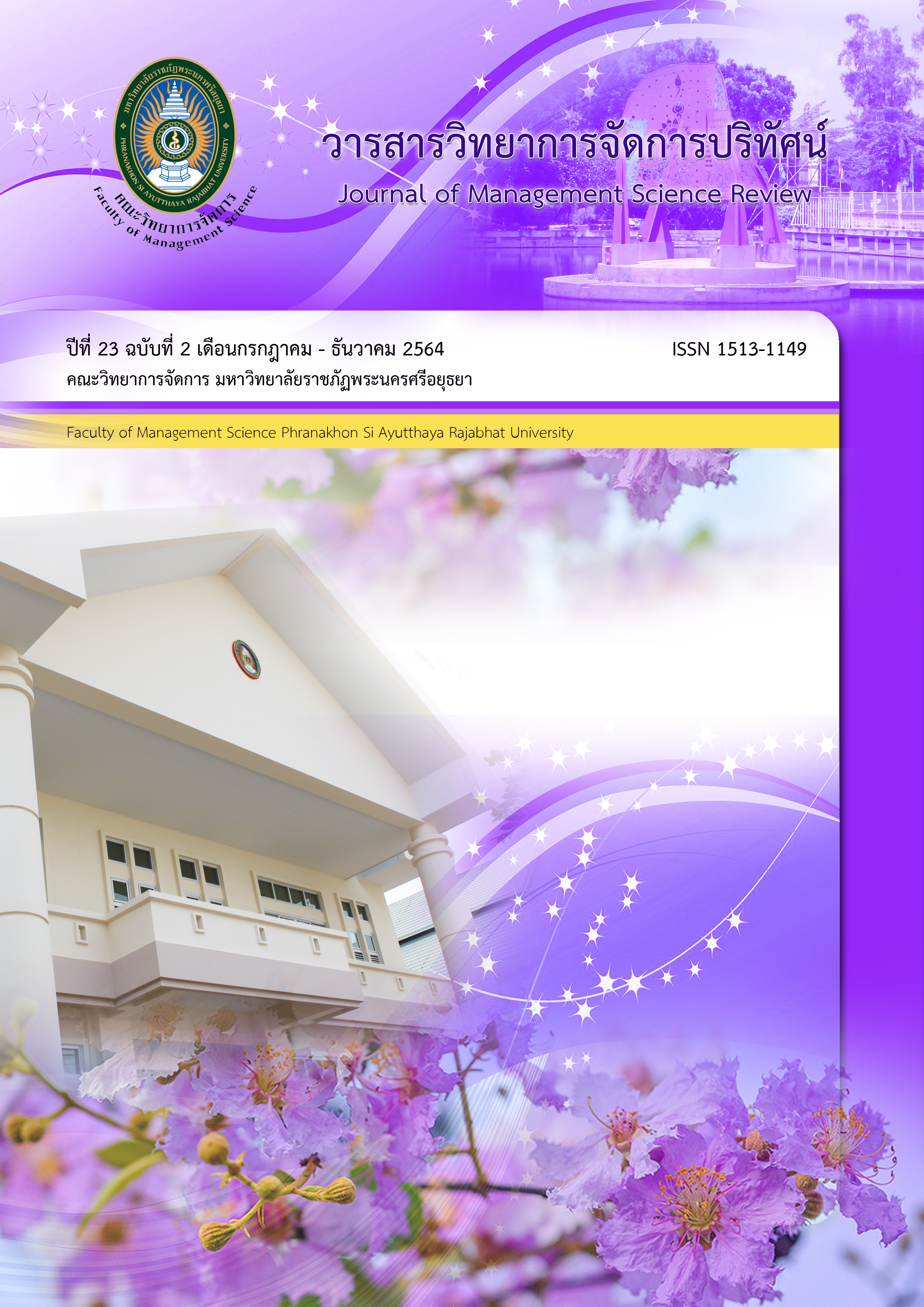บทบาทของผู้นำยุคใหม่ที่มีผลต่อการจัดการองค์การบนฐานวิถีชีวิตใหม่
คำสำคัญ:
บทบาทผู้นํายุคใหม่, การจัดการองค์การ, ฐานวิถีชีวิตใหม่บทคัดย่อ
บทความวิชาการเรื่อง “บทบาทของผู้นํายุคใหม่ที่มีผลต่อการจัดการองค์การบนฐานวิถีชีวิตใหม่” มีวัตถุประสงค์เพื่อให้เห็นถึงความสําคัญของผู้นํายุคใหม่กับการจัดการองค์การ และนําเสนอปัจจัยที่มีผลต่อการปรับตัวของผู้นํายุคใหม่บนฐานวิถีชีวิตใหม่ จากการเปลี่ยนแปลงของเศรษฐกิจยุคใหม่กับการบริหารงานในยุคโลกาภิวัตน์ที่ทวีการแข่งขันสูงขึ้น ทําให้เกิดความเจริญก้าวหน้าทางเทคโนโลยีและวิทยาการสมัยใหม่อย่างรวดเร็ว ต่อมาเมื่อโลกเข้าสู่การแพร่ระบาดของเชื้อไวรัสโควิด-19 ภายใต้เงื่อนไขของสถานการณ์โลก VUCA ทําให้องค์การภาครัฐและเอกชนจําเป็นต้องปรับตัวให้ทันกับการเปลี่ยนแปลง เพื่อความสําเร็จและความอยู่รอดขององค์การจึงส่งผลให้ผู้นํายุคใหม่และผู้คนต่างต้องปรับตัวเข้าสู่ฐานวิถีชีวิตใหม่ ซึ่งบทบาทของผู้นํายุคใหม่ที่มีผลต่อการจัดการองค์การบนฐานวิถีชีวิตใหม่ นั่นคือ ผู้นํายุคใหม่ควรปรับตัวโดยใช้ประสบการณ์ในอดีต การเปิดกว้าง การปรับปรุงด้านข้อมูลข่าวสาร การคิดค้นสิ่งใหม่อย่างมีเป้าหมาย การปลูกฝังกระบวนทัศน์ต่างๆ อย่างต่อเนื่องโดยใช้หลักการกระจายอํานาจ และผู้นํายุคใหม่ควรนําเครื่องมือ PEST Analysis โดยศึกษาจากแรงกดดันจากการเปลี่ยนแปลงต่าง ๆ ทางด้านการเมือง เศรษฐกิจ สังคม
และเทคโนโลยี เพื่อนํามาเปลี่ยนแปลงกลยุทธ์ โครงสร้าง ระบบการบริหารให้ทันต่อเหตุการณ์ และสร้างความได้เปรียบทางการแข่งขันเช่นเดียวกับการพัฒนาบทบาทผู้นํายุคใหม่สู่ฐานวิถีชีวิตใหม่อย่างยั่งยืนต่อไป
เอกสารอ้างอิง
กรมสุขภาพจิต. (2563). New Normalชีวิตวิถีใหม่. ค้นเมื่อ 19 กุมภาพันธ์ 2564, จาก www.bsh.go.th/download/Download/Download01.doc
โชติกา ใจทิพย์ และกฤษดา เชียรวัฒนสุข. (2561, มกราคม – มิถุนายน). ศักยภาพของผู้นำองค์กรธุรกิจในสถานการณ์โลกที่มีความผันผวนความไม่แน่นอน ความซับซ้อน และความคลุมเครือ. วารสารการจัดการธุรกิจ, 7(1), 1-14.
ทวีสันต์ วิชัยวงษ์ และยุภาพร ยุภาศ. (2562, กรกฎาคม – ธันวาคม). ภาวะผู้นำและทักษะในการบริหารงานในองค์การ. วารสารวิชาการแสงอีสาน, 16(2), 667-680.
ธเนศ ยุคันตวนิชชัย. (2560, มกราคม – มิถุนายน). การจัดการทรัพยากรมนุษย์ในเศรษฐกิจยุคใหม่. วารสารมนุษย์ศาสตร์และสังคมศาสตร์, 8(1), 48-67.
นุช สัทธาฉัตรมงคล และ อรรถพล ธรรมไพบูลย์. (2559, มกราคม – มิถุนายน). ผู้นำการเปลี่ยนแปลงในยุคโลกาภิวัตน์สู่การพัฒนาอย่างยั่งยืน. วารสารธุรกิจปริทัศน์, 8 (1), 167-182.
เนตร์พัณณา ยาวิราช. (2560). การจัดการเปลี่ยนแปลงและการพัฒนาองค์การ (พิมพ์ครั้งที่ 2). กรุงเทพฯ: ทริปเพิ้ล.
บุญเรือน ทองทิพย์. (2563, พฤศจิกายน). โรคติดเชื้อไวรัสโคโรนา 2019 (COVID-19) กับศักยภาพของผู้นำต่อการพัฒนาองค์การแบบ New Normal. วารสารสังคมศาสตร์และมานุษยวิทยาเชิงพุทธ, 5(11), 434-447.
มาลี บุญศิริพันธ์. (2563). รู้จัก "New Normal" ฉบับราชบัณฑิตยสภา. ค้นเมื่อ 19 กุมภาพันธ์ 2564, จาก https://news.thaipbs.or.th/content/292126
ราชบัณฑิตยสภา พ.ศ. 2563. (2563, 13 พฤษภาคม). "New Normal" ราชบัณฑิตยสภา. ค้นเมื่อ 29 มีนาคม 2564, จาก https://royalsociety.go.th/new-normal/
สุภศักดิ์ กฤษณามระ และกานต์ชนก บุญสุภาพร. (2563). ผู้นำองค์กรควรรับมือกับวิกฤตโควิด-19 อย่างไร?. ค้นเมื่อ 27 มีนาคม 2564, จาก https://www2.deloitte.com/th/en/pages/deloitte- private/articles/how- should- business- leadersrespond-to-the-covid-19-crisis-th.htm
Bolden, R. (2004). What is leadership?, Leadership South West Research Report, Centre for Leadership Studies.
Deloitte. (2020). Impact of COVID-19 on consumer business in India. Retrieved from https://www2.deloitte.com/content/dam/Deloitte/in/Documents/consumer-business/in-consumer-impact-of-covid-19on-consumer-business-in-india- noexp.pdf.
Farradia, Y. and Sunarno, M. (2020). Consumer Purchase Decision on Fresh Fish in the New Norm: Preliminary Case Study in Indonesia. Journal of Social Transformation and Regional Development, 2(1), 52-53.
Fleming, K. and Millar, C. (2019). Leadership capacity in an era of change: The new-normal leader. Journal of Organizational Change Management, 32(3), 310-319.
Hunt, J. G. (J.). (2004). What is leadership?. In Antonakis, J. A., Cianciolo, T. and Sternberg, R. J. (Eds.). The nature of leadership (pp. 19–47). n.p.: Sage Publications
IATA. (2020). COVID-19 Initial impact Assessment of the Novel Coronavirus. In IATA Economics.
Mainemelis, C., Kark, R. and Epitropaki, O. (2015). Creative leadership: a multi-context conceptualization. Academy of Management Annals, 9(1), 393-482.
Marquardt, M.J. (2000). Action learning and leadership. The learning organization, 233-240.
Maxwell, J. (2014). Good Leaders ask great questions. New York: Center Street.
Mckinsey. (2020). The future is not what it used to be: Thoughts on the shape of the next normal. Retrieved February 14, 2021, from https://www.mckinsey.com/featured-insights/leadership/the-future-is-not-what-it-used-to-be-thoughts-on-the-shape-of-the-next-normal.pdf.
Robbins, S. and Coulter, M. (2000). Management (7th ed.). New Jersey: Prentice-Hall.
UNCTAD. (2020). Technical Note: Global Trade Impact of the Coronavirus (COVID-19) Epidemic. Retrieved February 19, 2021, from https://unctad.org/system/files/official-document/ditcinf2020d1.pdf.
Wheelen, T.L. and Hunger, J.D. (2012). Strategic Management and Business Policy: Toward Global Sustainability. 13th ed. Boston: Pearson.
World Economic Forum (WEF). (2020). Coronavirus in China - Insights on the Impacts and Opportunities for Change. Retrieved March 4, 2021, from https://www.weforum.org/agenda/2020/03/coronavirus-china-opportunities-change/





